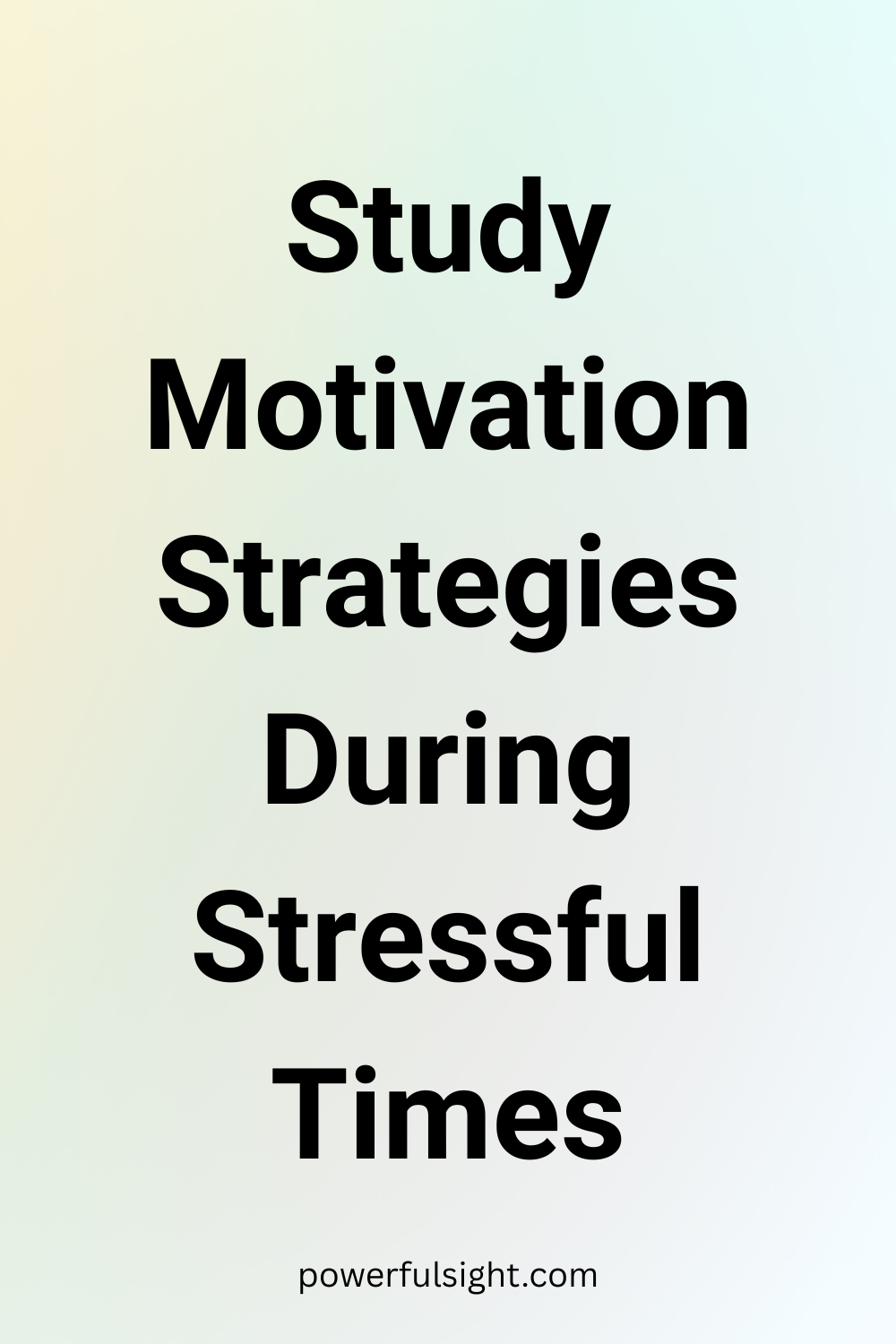Deadlines are piling up, exams are right around the corner, and you can feel the stress rearing its ugly head. With stress comes a decline in motivation. You feel as if you have no energy and can’t even open a book.
It’s a stressful time for sure, but rest assured that this is not the end of your academic life. Stressful times do not have to be your undoing; they are just a few hurdles along the way that you can overcome by using proven strategies to maintain study motivation.
This post will show you some great study motivation tips to implement the next time you’re going through a very stressful period.

10 Study Motivation Strategies to Use During Stressful Times
1. Break Up Tasks into Small Chunks
Oftentimes, when we feel overwhelmed, it’s because when we look at our to-do list, we see tasks that are very large and time-consuming. This usually kills motivation on the spot. One of the ways to cope with stress is to focus on breaking up tasks into smaller, more achievable chunks.
Instead of thinking, “I have to study for my exam,” break it up into parts.
For example:
-
Day 1: Review Chapters 1 and 2
-
Day 2: Practice problems from Chapters 3 and 4
-
Day 3: Review notes for Chapter 5 and test yourself
This way, it doesn’t seem as overwhelming, and you’ll have a clear plan to follow. When you complete a small portion of your goal, you will feel a sense of accomplishment, which will help build momentum.
Related: Time Management Habits for Focused Studying
2. Set Specific, Achievable Goals
One of the traps of stress is trying to do everything at once. In the end, you may not accomplish anything. A better strategy is to focus on setting specific and achievable goals.
For example, setting a goal of “study more today” is not specific. But saying, “study for 45 minutes on Chapter 3” is. Focusing on specific goals within a set time frame that you know you can complete, and rewarding yourself for finishing them, is a great way to stay motivated during stress.
Some examples include:
-
Set a timer: Use the Pomodoro Technique (25 minutes of study, followed by a 5-minute break) to stay focused.
-
Use a study checklist: Each time you cross a task off, you will feel a sense of progress. Your study session won’t seem as daunting.
Related: 17 Effective Ways To Set Reading Goals
3. Create a Productive Study Environment
Your study environment has a large impact on your motivation. When you’re stressed, your environment will either help you focus or make it more difficult. For example, if you’re in a loud, cluttered room, you will have a hard time concentrating.
The better your study environment, the more motivated you will be.
Here are some strategies to ensure your study environment is productive:
-
Clear the clutter: Organize your desk, clear away any distractions, and have only what you need on hand (computer, books, pens, etc.). When your study space is neat, your mind will also feel clearer.
-
Control your distractions: Do you find yourself constantly picking up your phone? Put it in another room or use apps that can help you stay focused, like “Focus@Will” or “Forest.”
-
Experiment with background music: Some people are very productive with ambient or study playlists. Try listening to calming instrumental music to help you focus.
Related: 100 Motivational Quotes for Success: Ignite Your Drive and Achieve Your Goals
4. Focus on Self-Care
Stress also takes a toll on the body, not just the mind. When you don’t take care of yourself, it will be more difficult to study. Here are some self-care strategies to help you feel energized and in the right mindset to study:
-
Sleep: Never skimp on sleep, especially when stressed. Sleep is key for concentration, memory retention, and mood stabilization. Aim for 7-9 hours per night.
-
Exercise: One of the best ways to de-stress is to get your body moving. Just 10 minutes of stretching or a walk outside can work wonders for clearing your mind and boosting your mood.
-
Eat well: Eating junk food and drinking too much caffeine will only drain your energy and impair brain function. Fill up on brain-boosting foods like nuts, fruits, vegetables, and whole grains.
-
Drink water: Dehydration can cause you to feel tired and lethargic. Make sure you’re drinking water throughout the day to stay sharp.
Related: 8 Effective Ways to Study Without Motivation
5. Practice Mindfulness and Stress-Relief Techniques
It’s also important to remember that stress can make it difficult to think clearly. Therefore, practicing mindfulness and stress-relief techniques can help you reset and refocus.
Some examples include:
-
Deep breathing: Take a few minutes before a study session to focus on your breath. Breathe deeply through your nose, hold, then exhale. Focus on your body as you breathe.
-
Meditation: Even just five minutes of deep breathing or meditation before a study session can help calm anxiety and allow you to focus your energy on your studies.
-
Journal: Writing down your thoughts can be very therapeutic and help clear your mind.
Related: How To Build Motivation Quickly
6. Find Your “Why”
During a stressful time, it can be easy to forget why you’re doing what you’re doing. But remembering your “why” is an excellent way to remain motivated and keep your eye on the prize. For example, if you are studying for a big exam, what is your purpose or goal?
Some reasons you might be studying include:
-
You want to accomplish your academic goals and make your family proud.
-
You are working toward a future career that you are very passionate about.
-
You want to prove to yourself that you can overcome adversity and push through a tough time.
Whatever your “why” is, write it down and keep it somewhere visible. Reflect on your “why” when you feel like your motivation is slipping. Your reason will drive you forward, even during your lowest moments.
7. Celebrate Small Wins
Another challenge during stressful times is focusing on everything we haven’t done. As a result, we forget to acknowledge all that we have already accomplished. Celebrating small wins, no matter how small they may seem, will help you stay motivated and build momentum.
After a study session, take a moment to congratulate yourself on what you’ve accomplished. You might have finished a chapter, practiced a set of problems, or taken good notes. Whatever it is, take a moment to recognize it. Reward yourself with a little something (a favorite snack, a relaxation break, etc.), then move on to the next task.
8. Social Support
Don’t be afraid to ask for help or reach out to others. Having support from others during a stressful time can be a great way to boost your motivation. For example, consider the following social support techniques:
-
Study buddy: Find a friend or someone to study with you. It will make you feel less alone and also help you stay focused and accountable.
-
Vent: If you’re really stressed out, talking to a friend or family member about it can help release some of the built-up tension. They will also likely offer words of encouragement.
-
Online support: There are many online study groups or forums where you can find other students who are experiencing the same academic struggles as you.
9. Take Breaks and Don’t Overdo It
In a bid to study and get as much work done as possible, don’t neglect taking breaks. When you don’t rest or take breaks between study sessions, you will become burnt out. And when you are burnt out, studying becomes even more difficult.
When scheduling your study sessions, be sure to take breaks every 45 minutes or so. During this time, stretch, grab a snack, or do anything that helps you relax. You will return to your studies feeling rejuvenated and ready to continue.
10. Progress Over Perfection
The last thing I want to mention about study motivation during stressful times is to avoid perfectionism. When stressed, it can be easy to get caught up in trying to make everything perfect. But this is a surefire way to procrastinate and accomplish very little.
Instead, focus on making progress. It’s okay not to have all the answers or to not finish everything in one go. The important thing is to keep moving forward, even if it’s only one small step at a time. Every study session counts, and every little bit helps.
Final Thoughts
Stressful times can be a nightmare for any student, but they don’t have to be. If you have the right strategies in place, you can remain motivated to study even during challenging periods. By breaking up your tasks, setting specific goals, creating a good study environment, and taking care of yourself, you can use stressful times to your advantage rather than letting them overwhelm you.
Remember that you are more capable than you think. So stay patient with yourself, be kind to yourself, celebrate your small wins, and keep your “why” in mind. With these study motivation strategies, you’ll not only remain motivated through stressful times, but you’ll also gain the strength to power through anything.
Save pin for later.

- 9 Things Daughters Of Narcissistic Mothers Don’t Do - 02/03/2026
- Daughters of Narcissistic Mothers Healing Affirmations - 27/02/2026
- 5 Perfect Mother’s Day Gift Ideas (That She’ll Truly Love) - 27/02/2026
